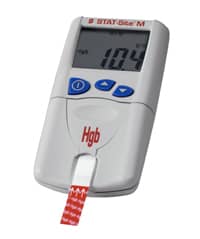EKF Diagnostics, UK, introduces a novel test to accurately identify diabetic patients at high risk of progression to end stage renal disease (ESRD) up to 10 years in advance of currently available tests, according to the company.
The new sTNFr1 test is an ELISA assay.

The sTNFr1 test is an easy-to-use microtitre plate assay requiring minimal training. As an ELISA-based assay, standard laboratory equipment can be used to analyze just 50 µL of blood serum or plasma. It uses monoclonal antibodies to give accurate and reliable results in a few hours. It has minimal interference and no cross reactivity with sTNFr2.
It accurately and reliably detects circulating levels of Soluble Tumor Necrosis Factor receptor 1 (sTNFr1) in patient samples. Recent research1 has demonstrated that high circulating levels of sTNFr1 are strongly associated with progression to ESRD in patients both with and without overt nephropathy.
The test results are a follow-up to last year’s license agreement with the Joslin Diabetes Center, Boston, for the exclusive rights to its novel kidney biomarker intellectual property (TNFr1 and 2). EKF has worked in partnership with Joslin and other European diabetic research centers to further validate the findings 2, 3 for the two markers and to develop the new clinical diagnostic test.
Kidney complications are one of the most life-threatening complications of diabetes. About a half a million people in the United States have ESRD, which requires treatment through dialysis or kidney transplantation. Nearly 44% of these cases are due to diabetes.
The test will be highlighted at The American Diabetes Association (ADA) 73rd Scientific Session, Chicago, at booth number 982.
References:
1. Circulating TNF Receptors 1 and 2 Predict ESRD in Type 2 Diabetes. Niewczas M, Gohda T, Skupien J, et al. J Am Soc Nephrol. 2012 Mar;23(3):507-15.
2. Risk of ESRD and All Cause Mortality in Type 2 Diabetes According to Circulating Levels of FGF-23 and TNFR1. Jung Eun Lee, Gohda T, Walker W, et al. PLoS One. 2013;8(3):e58007.
3. Baseline Markers of Inflammation Are Associated With Progression to Macroalbuminuria in Type 1 Diabetic Subjects. Lopes-Virella M, Baker N, DCCT/EDIC Research Group, et al. Diabetes Care. 2013 Mar 20 [ePub ahead of print].
[Source: EKF Diagnostics]


